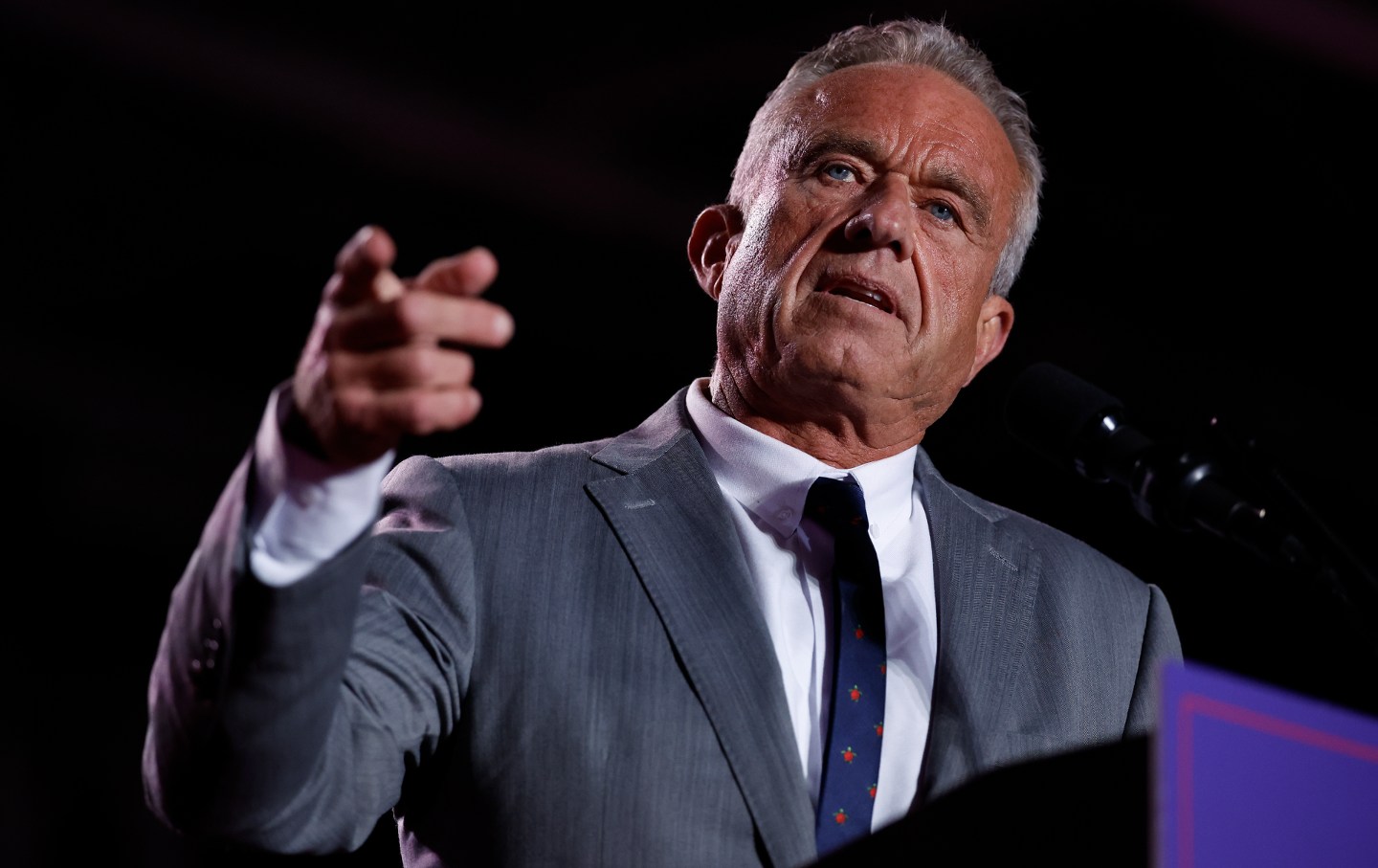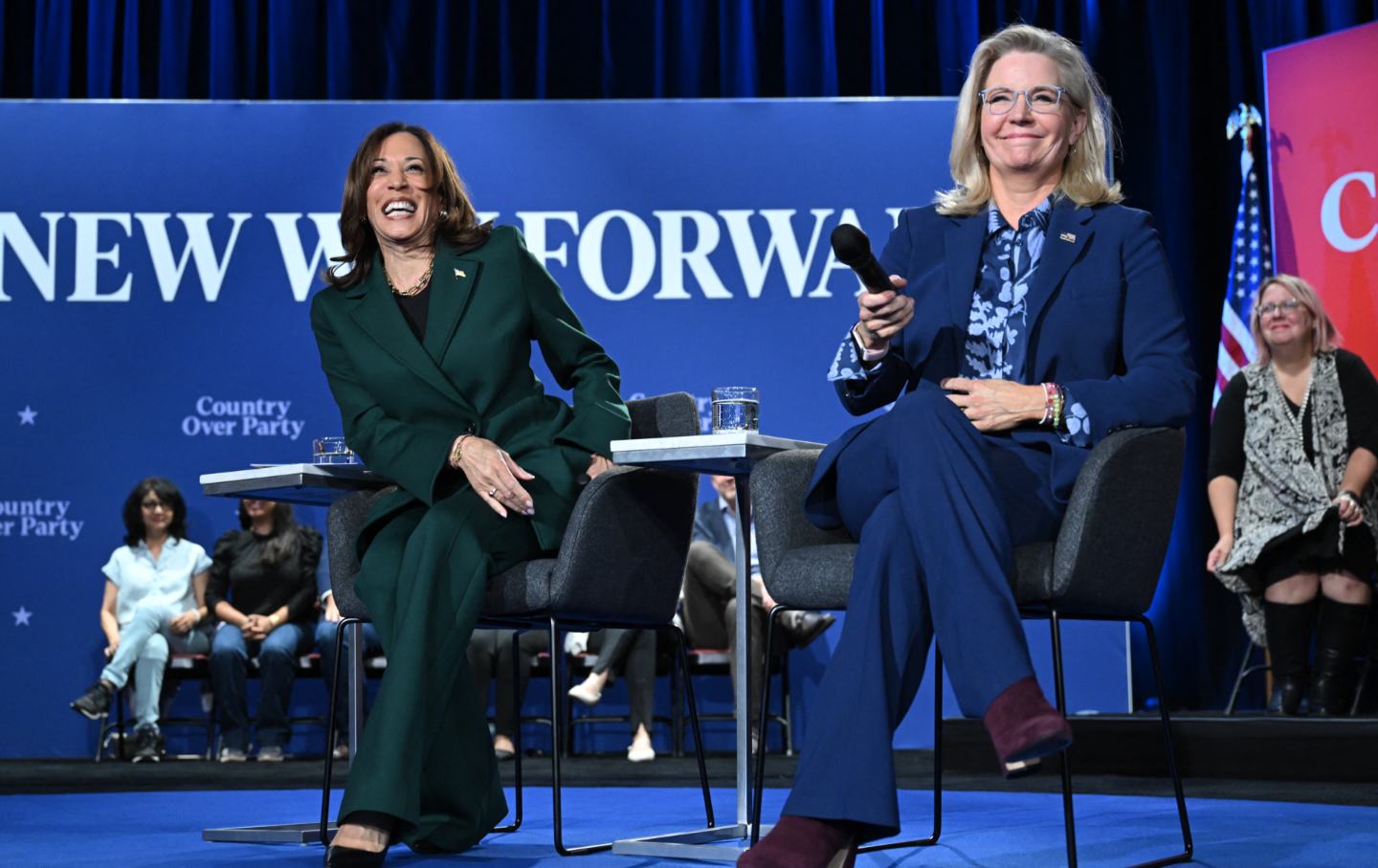Iowa Republicans Decide They Want to Lose Again With Donald Trump
The former president won the first caucus state. But a striking one-third of caucus-goers told pollsters that a convicted Donald Trump would be unfit for office.

Donald Trump after speaking at a caucus night party in Des Moines, Iowa, Monday, January 15, 2024.
(Andrew Harnik / AP)Dubuque, Iowa—“This is the earliest I can remember ever calling such a thing,” declared CNN anchor Jake Tapper, as the network announced just minutes into the count of Iowa Republican caucus votes that Donald Trump would be the winner with around 50 percent of the vote. The former president, said Tapper, was “pulling off a huge early victory in his bid to return to the White House…easily defeating his top opponents, Ron DeSantis and Nikki Haley, who are now in a high-stakes fight for second place.”
True enough.
But the most compelling news of the night was not that Iowa Republicans had—on what locals were labeling “the coldest caucus night in history”—done what everyone expected them to do, by choosing to further elevate the front-runner in the race for the party nod.
What mattered more was a statistic found submerged in the entrance poll data collected from caucus-goers.
“Few GOP caucus goers express concerns about the criminal charges Trump currently faces,” announced a review of an entrance poll that surveyed Iowa Republicans on caucus night. “Roughly 6 in 10 say that they’d consider Trump fit for the presidency if he were to be convicted of a crime, with only about one-third saying they wouldn’t see him as fit in that circumstance.”
Talk about burying the headline!
Yes, 63 percent of Iowa’s very conservative and majority-MAGA Republicans said they would vote in November for a convicted felon. That’s very much in character for self-proclaimed MAGA Republicans, whose enthusiasm for Donald Trump knows no bounds. But a striking 32 percent of Iowa Republicans who were surveyed said Trump—who faces 91 indictments in a string of criminal trials that could begin as early as March—would, if he were convicted of a crime before the election, be “unfit for office.”
Trump is definitely on track to win the Republican nomination. Iowa confirmed that reality, giving the loser of the 2020 presidential race a majority of all votes cast on caucus night. But the caucuses suffered from an enthusiasm gap; turnout was the lowest since 2000. And there is evidence to suggest that the gap could grow as Trump’s legal troubles come into focus.
What happens if Trump is convicted before November on one or more of the many charges he currently faces? Haley and another remaining Republican contender, former Arkansas governor Asa Hutchinson, have sought to make an electability argument based on Trump’s troubles—along with widespread concerns about his record of harming rather than helping down-ballot Republican candidates, as happened in 2018, 2020, 2022, and the 2023 off-year election.
The points made by Haley and Hutchinson are well taken, as the Iowa entrance poll suggests.
A conviction is not beyond the realm of possibility, particularly when juries will have 91 separate chances to find Trump guilty. (The former president faces four felony counts in Washington, D.C., for seeking to overturn the results of the 2020 election, 13 felony counts in Georgia for election interference, 34 felony counts in New York for making hush-money payments, and 40 counts in Florida for mishandling classified documents.)
Pundits and Trump allies have long assumed that very few Republicans would care if their nominee headed into the November competition as a convicted felon.
But the entrance poll result indicates that a convicted Donald Trump would be seen as unfit by roughly one-third of Republican voters—in Iowa and, it’s reasonable to presume, nationally. Trump won’t lose all of them. Party loyalty is a powerful force, and there are plenty of Republicans who will ultimately vote for a candidate they consider unfit simply because there’s an “R” next to his name.
But if the Republican nominee in what’s expected to be a very close fall contest loses a significant portion of Republican voters, that nominee is in serious trouble.
This provides an opening for President Biden, who is all but certain to be the Democratic nominee. Referring to the 32 percent of voters who indicated that they would see a convicted Trump as “unfit,” veteran Democratic consultant David Axelrod said that, for the Biden campaign, “it creates a universe of voters I want to talk to.”
Popular
“swipe left below to view more authors”Swipe →What voters might Biden’s team want to talk to? Look at the support in Iowa for Haley, the former UN ambassador and South Carolina governor whose surging campaign attracted roughly 20 percent of the Republican caucus vote on Monday night, almost displacing Florida Governor Ron DeSantis in a state that DeSantis had made the focus of his 2024 bid. The latest NBC News/Des Moines Register poll, released one day before the caucuses, found that almost half of Haley’s voters would abandon a Republican ticket led by Trump. A review of the polling data by The Hill noted that “43 percent of Haley backers in the state said they would vote for Biden if Trump is the GOP nominee, while 23 percent say they would vote for the former president. Eight percent said they would vote for independent candidate Robert F. Kennedy Jr.” Among the overall pool of Republican caucus-goers, according to the NBC News/Des Moines Register poll, 11 percent said that, in a Trump-Biden race, they’d back Biden.
That’s without a conviction.
With a conviction, Trump’s got an even bigger problem. The Iowa entrance poll points to that reality. And the caucus-night survey is not an outlier. A Washington Post review in December of national polls that had explored the conviction question—including a New York Times/Siena College survey, a Reuters/Ipsos poll, a Quinnipiac University poll, a Wall Street Journal poll, and a recent survey of Tennessee voters by Vanderbilt University—determined that, while “a huge number of Trump backers would stick with him even if he is a felon,” the polls “also show that a conviction could turn off a group of voters that is significant enough to effectively lose the race for Trump.”
We cannot back down
We now confront a second Trump presidency.
There’s not a moment to lose. We must harness our fears, our grief, and yes, our anger, to resist the dangerous policies Donald Trump will unleash on our country. We rededicate ourselves to our role as journalists and writers of principle and conscience.
Today, we also steel ourselves for the fight ahead. It will demand a fearless spirit, an informed mind, wise analysis, and humane resistance. We face the enactment of Project 2025, a far-right supreme court, political authoritarianism, increasing inequality and record homelessness, a looming climate crisis, and conflicts abroad. The Nation will expose and propose, nurture investigative reporting, and stand together as a community to keep hope and possibility alive. The Nation’s work will continue—as it has in good and not-so-good times—to develop alternative ideas and visions, to deepen our mission of truth-telling and deep reporting, and to further solidarity in a nation divided.
Armed with a remarkable 160 years of bold, independent journalism, our mandate today remains the same as when abolitionists first founded The Nation—to uphold the principles of democracy and freedom, serve as a beacon through the darkest days of resistance, and to envision and struggle for a brighter future.
The day is dark, the forces arrayed are tenacious, but as the late Nation editorial board member Toni Morrison wrote “No! This is precisely the time when artists go to work. There is no time for despair, no place for self-pity, no need for silence, no room for fear. We speak, we write, we do language. That is how civilizations heal.”
I urge you to stand with The Nation and donate today.
Onwards,
Katrina vanden Heuvel
Editorial Director and Publisher, The Nation
More from The Nation

The Red Wave Didn’t Hit Statehouses in This Election The Red Wave Didn’t Hit Statehouses in This Election
State-level Democrats largely held their ground, even scoring key victories in battleground states—and under Trump, that’s going to matter.

How Nominally Pro-Choice RFK Jr. Can Get Anti-Abortion Groups to Back His HHS Nomination How Nominally Pro-Choice RFK Jr. Can Get Anti-Abortion Groups to Back His HHS Nomination
He can pick a strident abortion opponent like Roger Severino, who wrote the Project 2025 chapter on HHS, as his number two.

Red Flags Red Flags
The result of the presidential election reflects individual and collective responsibility.

How Loyalty Trumps Qualification in Trump Universe How Loyalty Trumps Qualification in Trump Universe
Meet “first buddy” Elon Musk.

Bury the #Resistance, Once and For All Bury the #Resistance, Once and For All
It had a bad run, and now it’s over. Let’s move on and find a new way to fight the right.

Trans People Shouldn’t Be Scapegoated for Democrats’ Failures Trans People Shouldn’t Be Scapegoated for Democrats’ Failures
Politicians and pundits are stoking a backlash to trans rights in the wake of the election. They’re playing a dangerous game.


